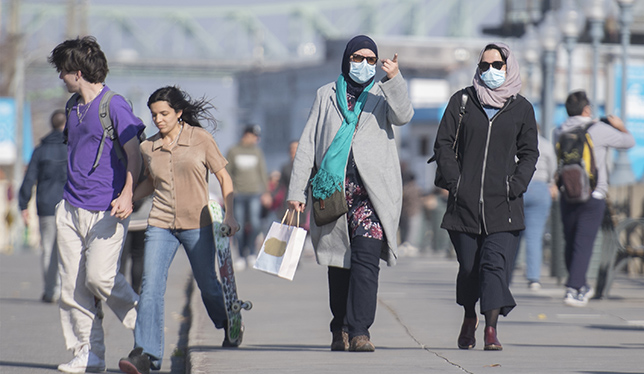Researchers investigate how racialized groups are faring during the pandemic
For Canada to succeed in curbing COVID-19, all communities need to succeed, says Brock University president and co-investigator Gervan Fearon.

As a young Arab, Palestinian, first-generation immigrant woman, Shireen Salti says she has lived with race-based inequities “my whole life.” COVID-19, she says, has amplified those inequities for all ethnic populations.
“Preliminary research indicates that unemployment rates are very, very high and are a major concern to all racialized communities,” she says. “They are the ones on the frontlines facing the brunt of the pandemic … without the option of working from home.”
As the executive director of the Canadian Arab Institute (CAI), Ms. Salti says there is a lack of research-based data on how ethnic communities are faring during the pandemic and how they can be better informed and supported in curbing COVID-19. To fill this gap, the CAI partnered with Brock University and the University of Toronto’s Rotman School of Management in a community-based research project to evaluate the impact of COVID-19 on Arab, Black, Indigenous and South Asian communities in Canada.

“The most recent data from the city of Toronto, for example, indicates Black people and people of colour make up a staggering 83 percent of recorded COVID-19 cases while only making up half of Toronto’s population,” she notes. To gather information on the pandemic experiences of these ethnic populations, 70 racialized research assistants were sent to Toronto, Montreal, Ottawa, Edmonton and Windsor to conduct interviews with them.
“We really wanted to look at this from a race-based data collection lens and we wanted it to be research done for the community, by the community,” Ms. Salti says. Launched in August, the Impact of COVID-19 Pandemic on Equity-Seeking Groups across Canada Survey is nearing the end of the interviewing and data-gathering stage, although Ms. Salti says people can still take part in an online survey. “Hundreds of people have submitted online surveys, but we are looking to reach thousands so that we have more influential data to rely on.”
Brock University president Gervan Fearon, one of the study’s co-investigators, says if Canada is going to succeed in mitigating the pandemic, then all communities have to succeed. This survey will look at the mental, emotional, social and physical effects of the pandemic, while delving into specifics such as how racialized communities get their information.
“If information is being distributed to mainstream media, but then missing community-based media, some individuals may not have access to the same information in terms of addressing or being immediately aware of the strategies to take in a pandemic,” says Dr. Fearon. This information, he says, will ensure policymakers aren’t missing those alternative, vital channels of communication.

The survey will also look at how specific communities cope during a crisis. “For some communities, their coping strategy may be the need to come together and have community engagement,” says Dr. Fearon. “In the case of a pandemic, that natural or usual behaviour can be challenging, so having information like that and identifying those communities is really important.”
When analyzing and reporting on their findings, Dr. Fearon says the research team will determine whether there are significant differences between the community groups they’re identifying and the general population; what those differences are and how those differences can inform public policy-making and strategies to address COVID-19. Ms. Salti says this information will benefit all Canadians in navigating the pandemic’s recovery phase.
“Policy that’s informed by the lived experience of racialized communities is often understated,” she says. “We can’t just have policies that don’t take into consideration the people who are most impacted.”
Featured Jobs
- Business – Lecturer or Assistant Professor, 2-year term (Strategic Management) McMaster University
- Veterinary Medicine - Faculty Position (Large Animal Internal Medicine) University of Saskatchewan
- Canada Excellence Research Chair in Computational Social Science, AI, and Democracy (Associate or Full Professor)McGill University
- Education - (2) Assistant or Associate Professors, Teaching Scholars (Educational Leadership)Western University
- Psychology - Assistant Professor (Speech-Language Pathology)University of Victoria















Post a comment
University Affairs moderates all comments according to the following guidelines. If approved, comments generally appear within one business day. We may republish particularly insightful remarks in our print edition or elsewhere.